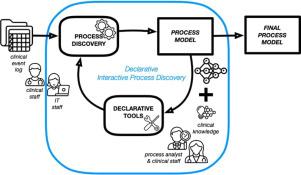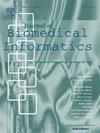A declarative approach for interactive process discovery in the clinical domain
IF 4.5
2区 医学
Q2 COMPUTER SCIENCE, INTERDISCIPLINARY APPLICATIONS
引用次数: 0
Abstract
Objective:
Process Mining (PM) is an established discipline with increasing adoption in the clinical domain. In this context, PM seeks to infer clinical processes from healthcare data collected in the Electronic Health Record. However, the particularities of clinical practice cause that, in most cases, the processes obtained result in an intricate network that hardly corresponds to clinical algorithms and, thus, are difficult to understand for clinical and IT personnel. To address these problems, our aim is to incorporate specialized clinical knowledge into the PM discovery algorithm.
Methods:
We propose a declarative approach to interactive process discovery in the clinical domain. Concretely, we present a set of declarative techniques that allows clinicians to incorporate their knowledge in the process, based on the Declare formalism.
Results:
The results of this work encompass both the declarative interactive approach and its implementation in the I-PALIA PM discovery algorithm, as well as an application to a use case for the treatment of prostate cancer. This application demonstrates that the implemented techniques are useful in managing typical problems that arise when applying PM methods to the clinical domain.
Conclusion:
This work proposes a novel approach with techniques for interactive process discovery in the clinical domain. This approach not only allows the clinical expert to interactively incorporate specialized knowledge into the PM algorithm, but also serves to obtain process models that are more comprehensible and better resemble treatment procedures.

临床领域交互式过程发现的声明性方法。
目的:过程挖掘(PM)是一门在临床领域日益普及的学科。在这种情况下,PM试图从电子健康记录中收集的医疗保健数据推断临床过程。然而,临床实践的特殊性导致,在大多数情况下,所获得的过程导致一个复杂的网络,很难与临床算法相对应,因此,临床和IT人员难以理解。为了解决这些问题,我们的目标是将专业的临床知识纳入PM发现算法。方法:我们提出了一种声明性的方法,以交互式过程发现在临床领域。具体地说,我们提出了一套陈述性技术,允许临床医生在过程中结合他们的知识,基于声明的形式主义。结果:这项工作的结果包括声明式交互方法及其在I-PALIA PM发现算法中的实现,以及在前列腺癌治疗用例中的应用。该应用程序证明了实现的技术在管理将项目管理方法应用于临床领域时出现的典型问题方面是有用的。结论:这项工作提出了一种新的方法与技术的互动过程发现在临床领域。这种方法不仅使临床专家能够交互式地将专业知识纳入PM算法,而且还有助于获得更易于理解和更类似于治疗程序的过程模型。
本文章由计算机程序翻译,如有差异,请以英文原文为准。
求助全文
约1分钟内获得全文
求助全文
来源期刊

Journal of Biomedical Informatics
医学-计算机:跨学科应用
CiteScore
8.90
自引率
6.70%
发文量
243
审稿时长
32 days
期刊介绍:
The Journal of Biomedical Informatics reflects a commitment to high-quality original research papers, reviews, and commentaries in the area of biomedical informatics methodology. Although we publish articles motivated by applications in the biomedical sciences (for example, clinical medicine, health care, population health, and translational bioinformatics), the journal emphasizes reports of new methodologies and techniques that have general applicability and that form the basis for the evolving science of biomedical informatics. Articles on medical devices; evaluations of implemented systems (including clinical trials of information technologies); or papers that provide insight into a biological process, a specific disease, or treatment options would generally be more suitable for publication in other venues. Papers on applications of signal processing and image analysis are often more suitable for biomedical engineering journals or other informatics journals, although we do publish papers that emphasize the information management and knowledge representation/modeling issues that arise in the storage and use of biological signals and images. System descriptions are welcome if they illustrate and substantiate the underlying methodology that is the principal focus of the report and an effort is made to address the generalizability and/or range of application of that methodology. Note also that, given the international nature of JBI, papers that deal with specific languages other than English, or with country-specific health systems or approaches, are acceptable for JBI only if they offer generalizable lessons that are relevant to the broad JBI readership, regardless of their country, language, culture, or health system.
 求助内容:
求助内容: 应助结果提醒方式:
应助结果提醒方式:


